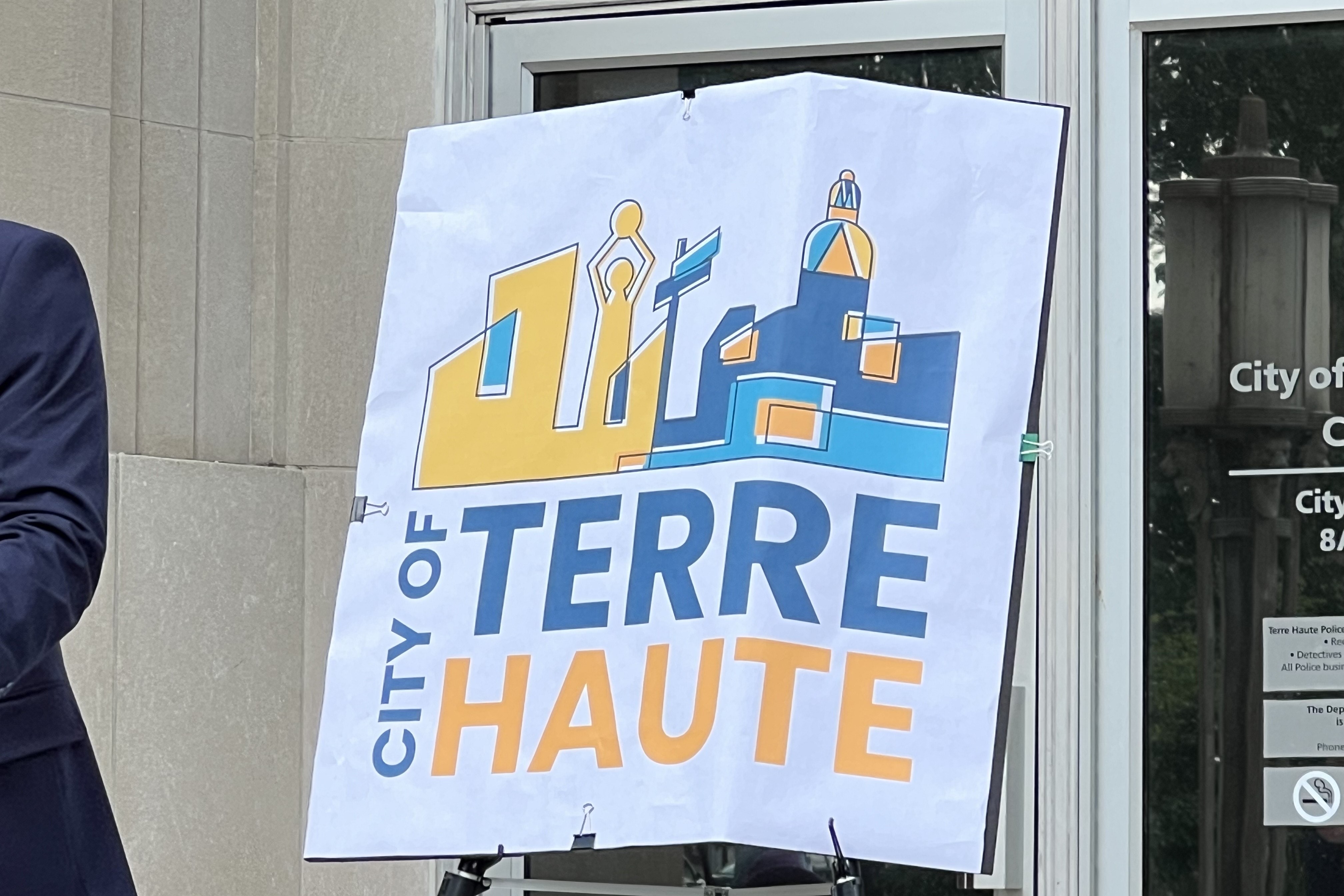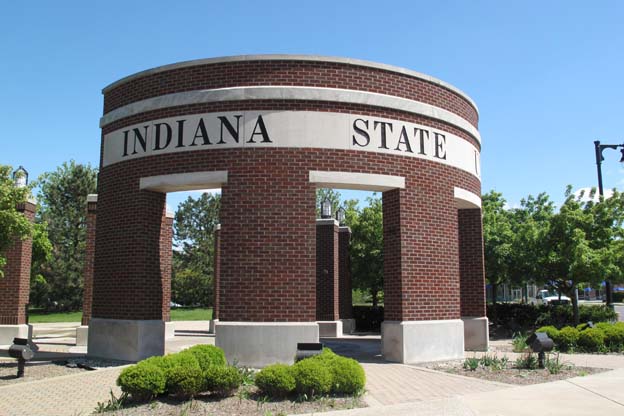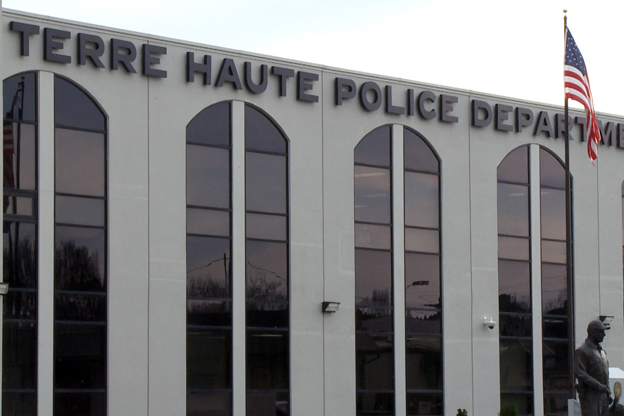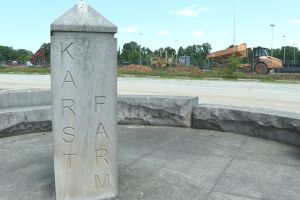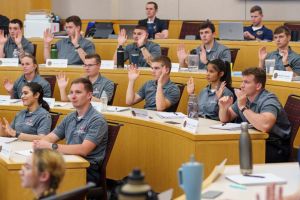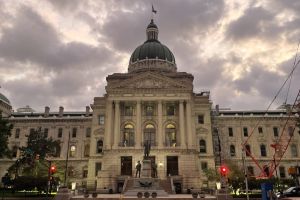All right, hello and welcome to Ask The Mayor on WFIU. I'm Joe Hren, this week we're with Terre Haute's Brandon Sakbun. Hello and welcome. Is the sun shining in Terre Haute today like it is here?
Speaker 2
You know, the sun is always shining. You gotta start with that. The answer is yes, it's a great 78 degrees outside. Our municipal golf courses are packed. We're actually hosting a high school sectional at the famous Ray Park. And our regular neighborhood parks are packed with construction and development in terms of new playground equipment and of course, with kiddos enjoying their summer break. So lots going on outside here in Terre Haute.
Speaker 1
Is there that little peaceful calm too, with the universities being out a little bit?
Speaker 2
I don't like that moving around. Yeah, your students in the summer, definitely, you are correct. I do think our downtown does a great job of a lot of outdoor events in the summer, strawberry festivals occurring Thursday, June 12. So you'll see a lot of programs still out and about downtown, not as many students, of course, though.
Speaker 1
We sent a reporter and videographer down a week or so ago to cover a new logo. I know you have a new flag. There's been a lot of new imaging and branding, why? Is it effective?
Speaker 2
I definitely think it's effective. I think it's symbolic of what we're doing as a city and as a community. We're taking down old homes and really focused on infill housing and addressing blight, fixing street curbs, sidewalks, and tidying up our parts. And I think, you know, it's symbolic to show the business community, and from a marketing perspective, that this is a new Terre Haute Indiana. We're investing in ourselves. We're collaborating with county government, with the school corporation, with our universities. We're focused on not just bringing in new companies, but reassuring the ones that are here, that this is a community that values them, that this is a place where families should live and where seniors should retire. So I think it's a symbolic visual example of where we're at as a community honoring our past and moving forwards in the future.
Speaker 1
I've been hearing a lot about budget cuts, kind of everywhere, nonprofits, schools and universities. Indiana State cut 32 positions last week. How does that affect the city? And does the city work with organizations that have those that have to be laid off?
Speaker 2
Ivy Tech also has a very strong presence in the city of Terre Haute, and there was a reduction in staff there as well. And you know, when you lose staff members from not one but two universities, it's the equivalent of losing a small company in our city. Definitely is difficult. We do kind of push towards the LinkedIn HR perspective to encourage them to share what roles are available in the community, to hopefully retain as many of those families as possible. Unfortunately, you know, the state is pushing a lot of cuts because of Senate Enrollment Act One. Here in the city, we are looking at a lot of cuts as well to help build a surplus for the next couple of years as property tax payments begin to come in fewer and fewer. So yeah, we've got a lot going on, but there's a lot behind the scenes to keep this whole situation moving forward, to address some of these cuts. And there are some folks here at the city who are going to retire, and we don't have a plan to fill those roles, because we will not be and that's one way to kind of through attrition, continue to build a team, but also continue to be budget conscious. We really do believe in government efficiency here, and we have for as long as I've been in the seat. So we're doing some modernization, technology and equipment updates to reduce operational costs as well. Before our universities, there's only so much of that they can do, and a lot of these universities are going to do a tuition freeze. So from a revenue and expense side, that's where we're at. And unfortunately, you know, I really wish the Hoosier State would re look at education, and specifically K through 12 and higher education, because I'm concerned about the Hoosier workforce. Joe, 60% of the jobs that are here today weren't a job in 1940 and I think is a state we need to focus on the workforce that will be here in 2040 and start building programming, development programs, working with the business community to ensure that if you are a company here in town, our graduates can graduate from our universities, from our high schools, and walk right into a company and begin to work. And we just got to take a look at this. You know, we're in the cut mine right now. I'd like us to be in a cut, but forward thinking growth mind.
Speaker 1
This is interesting, too, where Indiana State transferred property to the city looking for more single family homes. So can you explain how that works? So basically, the city will develop the area that Indiana State transfer to you?
Speaker 2
Well, let's kind of rewind, right? 20 years ago, you got Union Hospital here in Indiana State here, right? And you got a lot of property in between, and unfortunately, with urban sprawl, a lot of those properties fell into decay. Indiana State was protecting their university and purchasing property in and around them and taking down and demoing some of those homes that were creating safety risks. Fast forward, 20 years later, Indiana State. They're a great community partner, and they say, Hey, Mayor, we got property we're not going to use. What do you think? I said, Well, I've got a housing strategy, a housing plan. We know we need more homes. We know we need to practice infill housing. I always talk about the city like a skeleton, and infill housing is how you can fix like, add like, guts and muscles and organs inside of that skeleton to grow internally, instead of growing overall, at large. So we took that approach, that mindset, to Indiana State, worked with them to transfer 111 properties. We've got a number of local builders lining up out the door ready to go to build single family homes. We're not going to do multi family in this area. It's right by Indiana state. We're not trying to compete with dorms and do student housing. We are trying to do is bring in homeowners or long term renters and rebuild portions of our community that have been plagued played with some of society's worst and hardest issues, like generational poverty, drug addiction and some of these problems have just compounded, compounded on Hoosiers. But if you don't have a strong redevelopment growth strategy to bring in housing at all levels, to supplement housing with transportation to and from employment to bring employment or grow employment in your community, it will be nothing more than cheap vinyl homes. So we use an overall economic development strategy, a hand up mentality, to take an entire blank canvas and turn it into a community. Over the next decade, we hope to begin construction on some of these homes as early as next year.
Speaker 1
So then, do the residents buy the home from the city or from the university?
Speaker 2
No, they would not buy the home for the city or the university. The city, through our redevelopment department, would transfer those parcels to a builder with the expectation that a home is built within 18 months. That's a really good question. Okay,
Speaker 1
so then they buy it from the builder. Yes, I see, I see, okay, you announced a new approach to homelessness encampments through the police department. So how was it being handled? And then what changes are you proposed being made?
Speaker 2
It was handled through a mixture of departments, right? You've got the city kind of cleanup crews, police, public health individuals, nonprofit mental health advocates. And what we really do is we put that all under one umbrella. We play we've got a captain in charge of this program, brings our social worker, brings our medical teams, brings a cleanup crew and says, Hey, look. What can we do not to move you on? Right? I hate when someone said, just move the homeless out of your city. No. What can we do to get them into a better state of mind, to a better place in society? Can we get them employed? Can we get them some permanent supportive housing to get back on their feet, and a lot of these individuals have taken us up on services, many of which are now strong runners who are employed. So we see some successes, and we see some struggles as well. Some individuals do not want that help, nor do they want that support, and they will elect, on their own accord, to move to other areas of the community. And we have done a lot of cleanups. We've cleaned up a lot of camps. We work one on one with these individuals. I always say, No, you know these No, two cases are the exact same in this space, each person needs an individualized approach. Yes, I acknowledge the Supreme Court the decisions there how the state views this issue, but the state is currently closing state penitentiaries, right? So we see criminals that used to be housed in state facilities being pushed down to counties. A number of counties are struggling with jail overcrowding, and my mindset is with some of the crime that we have, not just in our city, but in our region. Why are we focused on locking up homeless individuals and when instead we should be focused on locking up dangerous felons, you know. And I think this, this narrative that we should just put homeless individuals into jails is, frankly asinine. What we should be doing is finding ways to bring them back into society and being productive members and give law enforcement the space in a jail to lock away criminals who are, you know, beyond violent and have done horrible things in our society. So it's just a different angle and a different approach to it. We have seen how a number of communities are handling it. I think Bloomington has done some great things. I think Evansville has taken some steps forward. And I think overall, in this ecosystem and this problem. Them said it's going to take a number of players to get it done. You've heard me say this, Joe the mayor's like a point guard facilitating the rock right, like Tyrese Haliburton letting others eat on the basketball court. We gotta get some other players involved in this. We gotta work with Union health and our street clinics for medicine. We gotta work with Mental Health America on housing. We gotta work with our community mental health center, Hamilton center, and we're going to work with social workers, law enforcement and, of course, the cleanup crew. It's a myriad of individuals that come together to score this basketball. And that's we're going to keep that's what we're going to keep on pushing.
Speaker 1
I was waiting for your first pacers reference, so we'll mark that.
Speaker 2
Well, maybe, I'm kind of like Tyrese. I'm waiting to the last possible win there. But there's a second one for you.
Speaker 1
You know, you mentioned social services, of course, many not for profit and with funding cuts, Grant cuts, service cuts. I mean, are those resources going to be there?
Speaker 2
Look, I'm concerned, right that continuing resolution runs out in September. I know WIC is a great organization childcare for individuals who are experiencing homeless or borderline homeless. You know, feeding programs snap Yes, Joe, I'm concerned a number of those programs are going to run out of funding. I am following the reconciliation bill that seems to be changing. You know, you could follow every politician on Twitter, and I don't encourage you to do this, because you're going to get a ton of gray hairs trying to figure out what's going to be in and out of this bill. I you know, we have reached out to the faith based community and some of our nonprofits to help fill that gap in the event that this federal funding is a sure, guaranteed and a cliff hits us in September of this year. But what we're also doing is, you know, we're partnering with larger nonprofits from outside the city to help bring in support. I know we chatted about the Pacers, but the Pacers have the drive and dish food program through one of their largest food banks in Indianapolis, and they do a lot of great work here. Catholic food Charities is doing a lot of great work here, and this isn't, you know, when we talk about social services, some individuals immediately say, we're not about that life. That's a handout, folks. That's not what we do here in the city of Terre Haute. We also have strong workforce development programs, strong adult education programs, and strong resources to say, hey, look, yes, we have social services, but we also want to get you employed. We also want to get you a home that you can either rent or own one day. And so this is a total package concept to where you know you're not just going through the archaic system of the social safety net of America, but you're modernizing it, using different resources on the table, building public private partnerships and trying to build an overall economy, part of which being is social services.
Speaker 1
Are there any current city ordinances regarding encampments on public land in Terre Haute?
Speaker 2
Yeah, you know, we do have some older ones that we definitely enforce. And I don't think we're going to go down the rabbit hole of trying to write some new ones, but what we are going to do is work with private property owners when it comes to trespassing, work with individuals. We have some of our some individuals in the homeless community who've made it very clear they don't want support, but they've also made it clear that they don't want to be bothered. And they help, you know, collect their trash, keep their area clean. They help move on. You know, they won't be in one location during daylight hours, and they're very clear in their communications with the city what their expectations are as well, not just our expectations, and I appreciate that, because those are individuals who are taking a clear step forward and helping our city clean, to be quite honest. So again, like I said earlier, each case is different. Some of those ordinances, some of that you can issue fines, but what are you going to find from a homeless person? Right? That's just, it just creates a whole layer of problems as well.
Speaker 1
Just a quick follow up question about the Indiana State transfer property to the city for more single family homes. So is the cost of those homes? Does those serve the greatest need of the city, or is that serving the university?
Speaker 2
When we reviewed, we did a very thorough housing study from Thrive West Central Indiana, showing that 3000 homes were needed to be built over a five year period in Terre Haute and Vigo County, I would anticipate these three bed two bath style designs, even some two bed two bath to float anywhere as low as 141 50, and as high as 250 again, based off of size and scope, we're seeing a number of those infill homes go right around that 150 to 175 200 rate. And so this is more catered towards workforce housing. When I say workforce housing, I talk about, okay, what are our largest employers paying? What's the type of employees? What are the types of employees they're bringing in, and what are they looking for? So we use area median income to help come up with different brackets for different types of housing projects, and we're building in all of them. We have not one, but two, section eight low income style housing projects being built right now. So. Have a number of high rate expensive, 350 404 50 style homes being built right now within the city. And yes, we have some infill homes being priced out at 90 to 150 160,000 so you need to stay balanced. You don't want just quote one type of housing. You need all housing to really build in this ecosystem.
Speaker 1
The first thing I asked you, what's new, this is before we started the show, and you said, demolition. So what? What's going on there?
Speaker 2
Yeah, so obviously, our residential demolition program continues to be successful. We're looking to take down another 30 condemned residential homes that the private sector has neglected that nobody wants to flip because it's too expensive to flip these homes. So we need to go back to a blank canvas. But also the old taro police station on 12th and Wabash is currently in the process of demolition. They've done a lot of great work contracting company the first 72 hours, we expect them to be complete here in the next several weeks, and we have signed a purchase agreement for a new downtown apartment complex to bring 100 studio apartments to our community within walking distance from a number of our quality of life amenities. When I talk about demolition, Joe, it's not quite just taking something down, but it's, how do you rebuild? Do you have a project in the pipeline? I think that's very important for all government officials, whether you're in the city or in the county, to know and understand. You know, yeah, you can tear down blight all day, people like that. It looks good. It's, you know, it's a it's progress. But to go from good to great, you gotta take things down and you gotta rebuild them. You gotta create an ecosystem where the private sector wants to invest in your community, where the private sector wants to rebuild in your community. And instead of celebrating an old building going down, you're celebrating an old building going down and a new building going up.
Speaker 1
I know we're running a little bit short on time, but I wanted to talk about the CIB, the Capital Improvement Board over there. Now in Bloomington, there's a new convention center just broke ground last week, and I just see it. Yeah, the CIB over there is moving on to another project, restoring the Indiana theater. So a common story among cities I know, Spencer, Columbus, yeah. Bloomington has the buzz. Kirk Chumley, these old downtown theaters all over and some are just have fallen into a state of disrepair. So can you give us a little bit of background of the Indiana theater there in Terre Haute. Yeah, absolutely. What you know about the CIB working with that.
Speaker 2
So I have the pleasure to serve as treasurer of the capital improvements board. A lot of folks kind of just thinking that as, oh, that's the board that oversees the convention center. Yes and no, it does oversee the convention center. But we're also trying to, you know, improve our community and bring other large, public, private partnerships to our community. A challenge that fell into our lap was the Indiana theater. We recognize that the president of one of our county commissioners did a study. That study came back and said, Hey, team, you need $30 million to turn this thing around. And I, frankly, I said, Better luck touching the sun. We got to have a little bit of fiscal responsibility here. Let's find a way to do this at a lower cost. I can't say enough positive comments about how that board approaches situation. Board president, Commissioner Chris weitzer, really said, Good. This makes sense. Let's dial this project back. I worked on financing. What can we afford? What can we move within the budget instead of an additional appropriation, we've started cleaning it out. We are going to do a roof renovation to stop the leaking. Next year, it looks like we'll do another infrastructure style update, and we're putting together an RFP to look for a theater management team, a theater management company, to come in and start running, you know, hopefully some movies, even some plays or different musical performances. We are in the works of a strong capital campaign to bring some additional non profit style donation style dollars to get this theater further up to speed. But it's going to take a three year process to really get it to where it's parade pretty, hopefully an 18 month process to get it to where it's functional. Been a very, very difficult project. Lot of people are very emotionally attached to the theater, and I understand that. I recognize that I want to preserve our history. I've taken a pragmatic, data driven financial approach to all of this. So when you space this out a little bit, you can slowly get there. But it has taken a number of conversations, a number of financial partners, and we believe we're starting to get on the right track with this roof renovation using funding already within the capital improvements board budget, without an additional appropriation.
Speaker 1
Does the CIB get most of its funding from a food and beverage tax or tax? Yes. Joe, okay, okay, that was all I had. What do you have? What else would you like to any announcements?
Speaker 2
You know, we are. We're hoping to have a couple of announcements here in the coming months. We're working through the redevelopment process on some of our larger brownfield properties. The EPA is coming back in town to do some additional testing. And we enjoy working with them. That's been a federal agency, even through the transition, that thankfully has stayed invested in the city of Terre Haute in our community. Look at the end of the day, Joe, I think, you know, we're really starting to work with other units of government, the county and the school corporation, to not just plan where we want the city of Terre Haute, but act in the way that we want to see the city of Terre act practicing fiscal responsibility, working on plans to improve infrastructure, physical construction is happening across our community right now, and we're dialed in 2026. Is going to be a great year for this city. I'm confident in that we've got to set some money aside and prepare for the Senate Enrollment Act One, the second and third order effects of that state legislation, but we're doing what we can with the limited budget. We're still working on recruiting some international and larger companies to come take roots in our city, and we're also working on some of our companies here in town to expand. I think overall, we're in a good place, and we look forward to seeing where we land at the end of the year. I hope everyone has a great and fun summer. And of course, I gotta end with this. Be sure to visit the city of Terre Haute parks, whether it's Deming park or the soon to be completion of hertz rose park with a $2.7 million renovation, or our two municipal golf courses. Come check out what we have to offer. Get outside play every day. And this is going to be a great summer for the city.
Speaker 1
I think our news director is coming back, so I'm going to be able to come visit Terre Haute soon for maybe the next show. We should pick out a place, maybe if your schedule permits to meet to do a show,
Speaker 2
yeah? Oh, absolutely. We'll, we'll go to construction site. Yeah, we might need headphones. Right,
Unknown Speaker
right, right. Yeah. Mayor Brandon sackbund, thank you so much. Appreciate your time.
Unknown Speaker
Thank you. Have a good day, Joe.








